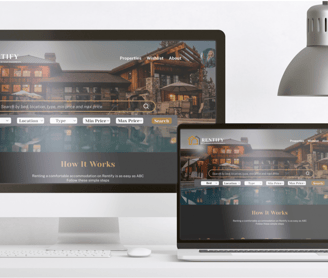Rentify Website
A website I made during Google Ux Design Certificate Programme


Project Overview
The Product
Rentify Responsive website will let users find decent and affordable properties to rent quickly without stress. It eliminates the frustrations associated with dealing with unprofessional real estate agents. Move into your dream home in 5 simple steps.
Duration
Overall: 3 months
Discovery & Research: 1 months
Design & testing: 2 months
Goal
Design a responsive website that allows users to easily and quickly find properties to rent successfully within their choice location and budget.
Problem
Busy people who need to rent decent and affordable apartments quicky without going through the stress of dealing with unprofessional real estate agents.
Tools
1 UX designer
6 developers
1 project manager
Figma
Miro
Photoshop
Team
My Role
Responsibilities
UX designer designing a website for a real estate.
Conducting interviews, digital wireframes, making low and high fidelity prototypes, conducting usability studies, accounting for accessibility, and iterating on designs.


EMPATHISE
User Research
Summary
Pain Points
I conducted interviews and created empathy maps to understand the users I'm designing for and their needs. A primary user group identified through research was working professionals who are too busy to search for apartments to rent who pay real estate agents to search on their behalf. This user group confirmed the stress associated with dealing with real estate agents who most times are manipulative and as a result influence the cost of rent upwardly. Other user problems included inability to transact with landlords directly, waste of time by agents, and non transparent mode of payment.
1. Busy people who need to rent decent and affordable apartments quickly without stress find it difficult using agents.
2. The stress associated with going around with agents to inspect random properties can be overwhelming.
3. Most agents are not straightforward in their dealings. They manipulate the rent process to their advantage.
4. People looking for properties to rent want to be anonymous and do not want their personal information exposed to third parties.
DEFINE
Personas
We wanted to form a deeper understanding of our users' goals, needs, experiences, and behaviors. So, we created 1 persona for our user segment. It was based on user interviews and surveys, and we kept updating them throughout the project as we gathered more data. We used this persona whenever we wanted to step out of ourselves and reconsider our initial ideas.


Eniola is a responsible family man who wants to conveniently find genuine and affordable accommodation to rent so that his child can grow up in a clean and healthy environment.
Problem Statement
User Journey Map
Mapping Eniola user journey revealed how helpful it would be for users to be able to find decent and affordable properties to rent quickly using Rentify Website.




Sitemap
Created a sitemap indicating how website will work for Rentify website


Paper Wireframes
Taking the time to draft iterations of each screen of the app on paper ensured that the elements that made it to digital wireframes would be well-suited to address user pain points. For the home screen, I prioritized a quick and easy search for available properties to help users save time.
Size Variation(s)
Taking the time to draft iterations of each screen of the app on paper ensured that the elements that made it to digital wireframes would be well-suited to address user pain points. For the home screen, I prioritized a quick and easy search for available properties to help users save time.


Ideate
As the initial design phase continued, I made sure to base screen designs on feedback and findings from the user research.
Digital Wireframes


As the initial design phase continued, I made sure to base screen designs on feedback and findings from the user research.
Size Variation(s)


Prototype Phase
Low Fidelity Wireframes
I took the time to draft iterations of each screen of the app on paper to ensure that the elements that made it to digital wireframes would address user pain points. Easy navigation was a key user need to address in the designs in addition to equip the app to work with assistive technologies. I created both Low Fidelity and High Fidelity wireframes
The final high-fidelity prototype presented cleaner user flows for searching for available properties, inspect selected property, rent property and download payment receipt.
Using the completed set of digital wireframes, I created a low-fidelity prototype. The primary user flow I connected was search for property, inspect property, rent property, fill tenancy agreement form and download payment receipt.
Mockups
I took the time to draft iterations of each screen of the app on paper to ensure that the elements that made it to digital wireframes would address user pain points. Easy navigation was a key user need to address in the designs in addition to equip the app to work with assistive technologies. I created both Low Fidelity and High Fidelity wireframes




Accessibility Considerations
1. Provided access to users who are vision impaired through adding alt text to images for screen readers.
2. Used icons to help make navigation easier.
3. Provided access to users who have problems seeing elements with low contrasts by using accessible colours.
Testing
Usability Study
Parameters
Findings
Study Type
Unmoderated usability study
Location
United States, remote
Participants
5 participants
Length
20-30 minutes
1. Users want to find properties to rent quickly.
2. Users want to be guided on the steps to successfully rent properties.
3. Users want to be able to keep records of their tenancy agreements and payment receipts.
Takeaways
Impact
Findings
The app makes users feel like Rentify really thinks about how to help people find affordable apartments to rent without stress. One quote from peer feedback: "Is this really happening? I can't wait to use this website to get my dream apartment".
While designing the Rentify Website, I learned to first discard the biases I had concerning renting properties so that I can fully understand users pain points. Usability studies and peer feedback influenced each iteration of the website designs.
Next Steps
1. Conduct another round of usability studies to validate whether the pain points users experienced have been effectively addressed.
2. Conduct more user research to determine any new areas of need.
Let's Get In Touch
Got a partnership idea, or a project you need help with? Shoot me a line and let's talk.


